5 Classic Movies That Almost Had Terrible Endings

WARNING: THIS WHOLE ARTICLE IS A SPOILER.
In a recent article about deleted scenes that would have ruined the film, we mentioned that the original ending to Clerks featured Dante getting shot to death, and the original ending of Terminator 2 featured a paradox that would have rendered the entire series impossible.
But those are hardly the only films that escaped having endings so bizarre that it's kind of amazing that they came so close to winding up in the final cut.
Army of Darkness Left Ash Stranded in Time
The Evil Dead trilogy is kind of in the same category as The Big Lebowski -- its cultural impact goes way beyond what you'd expect from the modest box office. Just ask yourself -- are you more likely to hear a college kid quoting a catchphase from one of those movies, or, say, Avatar?
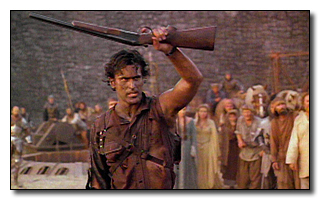
Who still hasn't heard the "boomstick" line?
In the third and final film, Army of Darkness, Ash (Bruce Campbell) has accidentally wound up in medieval times and just wants to get back to the present. Unsurprisingly, he winds up in a massive battle with the undead.
The Ending We Got:
After retrieving the Necronomicon, Ash uses a spell to finally go back to his own time, where he reclaims his job as a cashier at a department store. The film ends with one final attack by a possessed woman that involves a trampoline, a shotgun and a few last quips. It's a perfect, goofy, B-movie ending to the trilogy.

And just like that, Bruce Campbell earned cultural immortality.
What Did We Almost Get Instead?
In the original ending (and the one that persists as the official ending in versions of the film seen outside the U.S.), instead of using the Necronomicon, Ash is given a magic potion that will allow him to sleep for a century for every drop he drinks. Ash manages to mess up the count and drinks one drop too many.
This means, instead of waking up back home, he finds himself alone, in the ruins of some kind of apocalypse. He screams in anguish and ... then the movie ends:
The thing is, it's an appropriate ending if, say, you only watch the first film in the trilogy and then skip right to that ending. After all, the series started out as much more of a horror franchise, but stopped taking itself seriously right around the time Ash's hand got possessed and he was forced to replace it with a chainsaw. From then on, it became the goofy festival of blood, slapstick and one-liners that made Bruce Campbell a cult hero.
Oh, it still makes perfect sense to have him fuck up the potion, or to even make it so that he wakes up in a future full of zombies that need a good chainsawing. Instead it ends like some kind of Shakespearean tragedy, which is, uh, not exactly what we came to expect from the series.
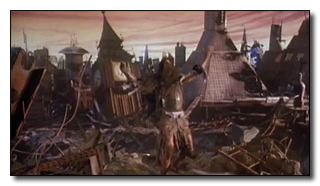
There's not even a chainsaw-hand in sight.
28 Days Later, In Which Zombies Are Fairly Easily Cured

After what must have been one of the worst bicycle accidents in history, Cillian Murphy's character, Jim, wakes up from a month-long coma, only to find London in ruins and bands of zomb- er, infected humans roving around and murdering survivors.
Fortunately, a group of survivors rescue Jim and tell him about the incredibly infectious disease spreading across the country. Coming in contact with even a drop of blood from someone infected with the virus they call "Rage" will turn a human into a zombie in around 30 seconds flat. It's all very scary.
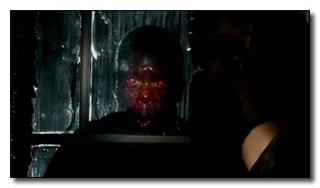
The Ending We Got:
What made this take on the zombie genre special was that there was real effort to make it somewhat realistic, which served to actually make it scarier. The "zombies" aren't magically resurrected dead, but simply the result of a laboratory-engineered infection that makes them go nuts. It lends an air of plausibility to the whole thing that sets it apart from a genre that for decades had leaned on camp and goofy social commentary.

Which was fine the first hundred times we saw it in a movie.
The ending plays to that -- the survivors don't find a miraculous cure for the infection and they don't "win" the war against the infected. The happy ending comes when they realize that the infection wasn't as widespread as they thought (England had been isolated from the rest of the world when the infection was discovered), and so it becomes a matter of waiting out the infected, who will starve and get weaker over time.
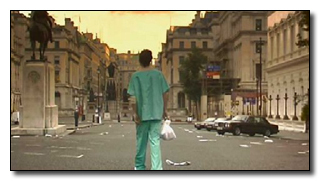
Basically, the same way we handle the flu.
As for Jim, he recovers from a gunshot wound, and it's implied that with time England will recover and everyone will retire to have a nice cup of afternoon tea and spotted dick.
What Did We Almost Get Instead?
There are actually several alternate endings out there, including the bleak version in which Selena and Hannah abandon a doomed Jim and walk out of the hospital, presumably to die themselves. There is no note of hope or anything of the sort, we just fade to black.
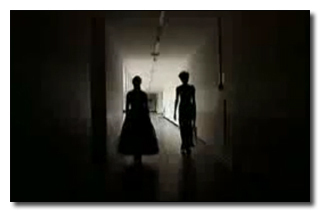
"Boy, this apocalypse sure turned out depressing."
But then we have what the filmmakers call the "Radical Alternative Ending."
In the middle of the film, one of the survivors, Frank, is infected with Rage, leaving him only a few moments of lucidity to say goodbye to his teenage daughter, Hannah, before the other survivors are forced to kill him. The scene is poignant and demonstrates again just how damning infection really is -- you only have seconds before you're gone. But in the Radical Alternative Ending, the survivors were going to keep Frank alive and in captivity. Kind of like a pet. Jim then decides to sacrifice himself by donating his (fortunately) matching blood to Frank so that his daughter could have her father back.

"I'm afraid your HMO considers this 'elective surgery'."
Stew on that for a second: The entire film is spent establishing that coming into contact with a single drop of blood from an infected person or animal means you have seconds before your mind is completely gone and you become an angry, red-eyed zombie. The disease completely wiped out all English civilization as a result. And the original ending was them fixing somebody with a simple blood transfusion? Nobody thought of that in the opening days of the outbreak?
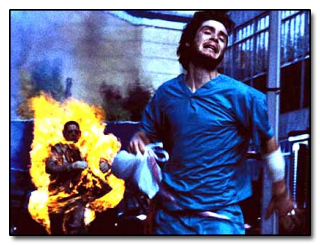
Nah, that would have been way too much trouble.
It was director Danny Boyle who put a stop to that ending. As he put it in the DVD commentary, the rag-tag group of survivors would have to "Drain of blood and scrub his veins with bleach" to save him. Well, hell, we would have watched that.
The Abyss Was Originally More Independence Day

The Abyss is the story of a group of Navy SEALs and offshore oil drillers attempting to recover a sunken nuclear submarine from the bottom of the ocean and keep it from detonating. That could have been a pretty awesome film on its own, but then aliens showed up.
This triggers a battle of wills between the military and the blue collar types as to how to treat the aliens -- as a national security threat, or as our new, glowing friends?

Nah, just kind of poke them in the forehead.
The Ending We Got:
The military guys wind up setting a timer on a nuclear warhead with the intention of killing the aliens. It's up to Ed Harris's character, Bud, to defuse it. He sacrifices himself, diving so far down that he won't have enough oxygen to make it back to base.
But, while he waits to die, the aliens show up and rescue him, moved by his sacrifice. The friendly, peace-loving aliens take him to their own aquatic spaceship to show him they intercepted his final private message to his wife, and to demonstrate their complete lack of personal boundaries. Then they take him, the crew and the entire damn rig to the surface on the hull of their ship. Roll credits.

BOING!
What Did We Almost Get Instead?
In an alternate version, the aliens aren't nearly as nice. They still bring Bud to their ship, but this time they do it for passive aggressive reasons -- to tell him they're going to wipe out human civilization.
They show him how much humanity sucks through news clips of the various atrocities committed by man throughout history, and boast about how they can pick up TV reception at the bottom of the ocean. Then they show him how they intend to wipe out humanity with super-tsunamis. The massive waves then actually start forming along every coastal city of the world, in a scene that had to have been the most expensive in the film:
This ending is confusing for a lot of reasons. Were the aliens down there watching our news for years, just seething? Why did they wait to end the world until they finally had someone to drag onto their ship and chastise? That seems awfully petty for an advanced life form. Even more bizarre, this ending assumed they were swayed to save humanity because of one love letter. Surely in all that news they were watching they would have caught at least one human interest story.
Most egregious, however, is the inherent hypocrisy of the message they later send through Bud. If it "bothers them to see us hurting each other," the best solution is probably not exterminating the species. The theatrical film never depicts the aliens as anything but curious, benevolent and eventually outright helpful, but no matter how you slice it, this alternative ending just makes them into fluorescent undersea dicks. Which kind of means the crazy Navy SEAL was right to try to nuke them.
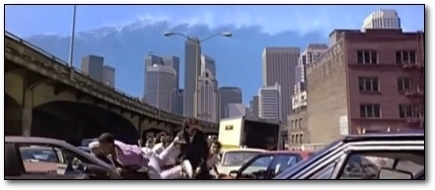
The only way to fight genocide is with more genocide.
Titanic Was Just ... Weird

Judging by the box office records, statistically everyone reading this already knows the story: Young Rose Bukater (Kate Winslet), trapped in an arranged marriage to a horrible man, is saved from jumping overboard and drowning herself by a penniless artist played by Leo DiCaprio who, in an ironic twist, ends up drowning a few hours later.
In between is a lot of drama and a surprising bit of nudity. As an old woman, Rose recounts the story to a salvage ship's crew headed by Bill Paxton, as they search for clues to what happened to the priceless "Heart of the Ocean" necklace.

There it is! Get her!
The Ending We Got:
We find out that Rose has in fact lived her whole life in possession of the necklace. After telling her story and showing naked drawings of herself to her granddaughter and a ship full of sailors, she sneaks out onto the ship's deck alone and drops the stone overboard in memory of her beloved Jack. Then she goes inside to (presumably) die in her sleep, dreaming of her fling on board the Titanic all those years ago.
The ending pretty well lines up with the rest of the movie: It's a tale of a tragic love that is doomed from the beginning due to circumstances beyond their control, but a love that still persists regardless. You know, like in the theme song.

Shut up, shut up, shut up, shut up ...
What Did We Almost Get Instead?
James Cameron can shoot the hell out of some special effects, but dialogue isn't really his thing. That's what makes the ending work -- no one is talking. Old Rose silently walks out, drops the necklace, then lays down to dream about banging young Leonardo DiCaprio.
That ending took some restraint on Cameron's part, because the alternate ending is a corny mess:
In this version, Bill Paxton and his crew rush out to stop her from dropping the necklace. Then, Rose looks right at the camera and states the lesson of the movie:
"You look for treasure in the wrong place, Mr. Lovett. Only life is priceless, and making each day count."
She drops the necklace overboard, prompting one of the crew members to scream, "THAT REALLY SUCKS, LADY!"
But Bill Paxton realizes she is right, and that material possessions mean nothing. Free from the burden of pursuing earthly riches, Paxton looks up toward heaven and laughs heartily.

In fact, they had a pretty hard time keeping him from laughing during every second of that scene.
Then he turns to Rose's granddaughter and asks, "Want to dance?"
Other than being amazingly goofy, her actions are completely pointless -- she's standing on a boat full of equipment and crew that is designed specifically for finding artifacts on the ocean floor, and that necklace is valuable enough to make everyone on board rich. Even if Bill Paxton has learned this important life lesson, the rest of the team knows exactly where the necklace was dropped. It'd take them about half an hour to go down and retrieve it. And if Paxton's character tried to stop them, we're pretty sure they'd toss him down there with Leo.

"Why are you all looking at me like th- wait, HELP!"

Terry Gilliam's film portrays a bizarre, dystopian future where the government has total authority, the population is entirely dependent on silly machines and a tangled bureaucracy controls every aspect of life.
The major events of the film are triggered when a fly caught in a printer causes a misprint that in turn leads to an innocent man being arrested and eventually killed in place of the terrorist who has a similar name.
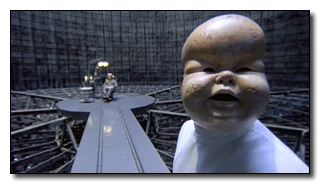
Oh, and the film was filled with creepy shit like this.
The Ending We Got:
The hero of the film, Sam Lowry, is a low-ranking government worker trying to save a woman who was mislabeled a terrorist after the fly incident. She resembles a woman he has dreamed about, in fantastic visions of himself flying high above his bullshit real life.
Sam eventually manages to use his position to declare Jill legally dead, allowing her to fall off the grid and escape the system. But when officials discover what he did, they catch Sam and torture him.

Science hat!
The ending is a wild, improbable escape from the government facility, through a world that bears a strong resemblance to Sam's own daydreams. Then, in the end, we learn that this is in fact all happening inside his broken mind, as he is once again escaping to his dream life, his only means to endure the torture. It's a fittingly dark ending to a movie so heavily influenced by "1984," preaching the bleak message of helplessness in a totalitarian state.
What Did We Almost Get Instead?
It's a very simple change: the happy hallucination is in fact really happening, and everything turns out perfectly fine.
In this version, Sam really does escape from torture ... through the power of love. He and the woman he was protecting make a daring getaway and live happily ever after.
It feels cliched at this point to complain about mindlessly happy Hollywood endings, but this is one of those cases where the ending would negate the entire point of the film. The final shot is still of Sam flying away in his dream/fantasy -- the dreams that used to be his escape from his dreary, dystopian life. But now he's using the dream to escape from ... a real world where everything has also worked out exactly, perfectly fine.

"I will fantasize for literally any reason whatsoever."
Needless to say, it was a brutal fight for Gilliam to get his version into theaters -- which he eventually won.
Find out How 23 Movie Plots Could Have Been Solved in Minutes. Or, for other movies that should've changed some scenes around, check out The 5 Most Easily Avoidable Movie Deaths and The 10 Best Animated Movies for (Traumatizing) Kids.
